|
|
|
Sort Order |
|
|
|
Items / Page
|
|
|
|
|
|
|
| Srl | Item |
| 1 |
ID:
117597
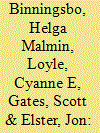

|
|
|
|
|
| Publication |
2012.
|
| Summary/Abstract |
This article introduces a new dataset on post-conflict justice (PCJ) that provides an overview of if, where, and how post-conflict countries address the wrongdoings committed in association with previous armed conflict. Motivated by the literature on post-conflict peacebuilding, we study justice processes during post-conflict transitions. We examine: which countries choose to implement PCJ; where PCJ is implemented; and which measures are taken in post-conflict societies to address past abuse. Featuring justice and accountability processes, our dataset focuses solely on possible options to address wrongdoings that are implemented following and relating to a given armed conflict. These data allow scholars to address hypotheses regarding justice following war and the effect that these institutions have on transitions to peace. This new dataset includes all extrasystemic, internationalized internal, and internal armed conflicts from 1946 to 2006, with at least 25 annual battle-related deaths as coded by the UCDP/PRIO Armed Conflict Dataset. The post-conflict justice (PCJ) efforts included are: trials, truth commissions, reparations, amnesties, purges, and exiles. By building upon the UCDP/PRIO Armed Conflict Dataset, scholars interested in PCJ can include variables regarding the nature of the conflict itself to test how PCJ arrangements work in different environments in order to better address the relationships between justice, truth, and peace in the post-conflict period.
|
|
|
|
|
|
|
|
|
|
|
|
|
|
|
|
| 2 |
ID:
117591
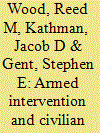

|
|
|
|
|
| Publication |
2012.
|
| Summary/Abstract |
Research has begun to examine the relationship between changes in the conflict environment and levels of civilian victimization. We extend this work by examining the effect of external armed intervention on the decisions of governments and insurgent organizations to victimize civilians during civil wars. We theorize that changes in the balance of power in an intrastate conflict influence combatant strategies of violence. As a conflict actor weakens relative to its adversary, it employs increasingly violent tactics toward the civilian population as a means of reshaping the strategic landscape to its benefit. The reason for this is twofold. First, declining capabilities increase resource needs at the moment that extractive capacity is in decline. Second, declining capabilities inhibit control and policing, making less violent means of defection deterrence more difficult. As both resource extraction difficulties and internal threats increase, actors' incentives for violence against the population increase. To the extent that biased military interventions shift the balance of power between conflict actors, we argue that they alter actor incentives to victimize civilians. Specifically, intervention should reduce the level of violence employed by the supported faction and increase the level employed by the opposed faction. We test these arguments using data on civilian casualties and armed intervention in intrastate conflicts from 1989 to 2005. Our results support our expectations, suggesting that interventions shift the power balance and affect the levels of violence employed by combatants.
|
|
|
|
|
|
|
|
|
|
|
|
|
|
|
|
| 3 |
ID:
117592
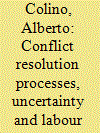

|
|
|
|
|
| Publication |
2012.
|
| Summary/Abstract |
In this article, the impact of diminishing levels of uncertainty on labour demand, as a consequence of conflict resolution processes, is tested by means of a case study of a European region largely affected by political violence. For this purpose, the response of Basque manufacturing employment during conflict resolution attempts is used as a natural experiment with which to evaluate the effect of reduced uncertainty on labour demand. Accordingly, using the difference-in-differences technique, which overcomes some of the shortcomings of previous studies, the relative performance of Basque labour demand during the last two attempts to bring peace to the region is quantified. The longest ceasefire episode ever declared in the region is shown to have triggered a reactivation in labour demand and, therefore, that Basque manufacturing firms responded positively to the reduction in uncertainty by significantly raising their average number of employees. More precisely, it is found that the average number of workers employed by Basque manufacturing firms increased considerably when credible peace talks directed towards the end of the conflict were undertaken. Thus, when compared with their counterparts in similar Spanish provinces, the truce declared in 1998 boosted employment demand in Basque companies by more than 4%, which reflects the economic dividend of peace to be reaped in the event of an eventual conflict resolution and the establishment of a peaceful environment in the region.
|
|
|
|
|
|
|
|
|
|
|
|
|
|
|
|
| 4 |
ID:
117594


|
|
|
|
|
| Publication |
2012.
|
| Summary/Abstract |
Post-conflict states represent an important research agenda for scholars studying foreign direct investment (FDI). While leaders of post-conflict states have strong incentives for trying to attract international investments, multinational corporations (MNCs) may view these states as high-risk since the reoccurrence of violence in the aftermath of civil conflict is common. Consequently, leaders of post-conflict states desperate to receive FDI to help ignite their stalled economies must convince MNCs that their state is a stable and secure place to invest in. Drawing on the recent literature that identifies the importance of domestic and international institutions for securing FDI, this article argues that post-conflict justice (PCJ) institutions can help post-conflict states attract investment. The domestic and reputation costs associated with implementing PCJ allow states to send a costly and credible signal to international investors about the state's willingness to pursue the successful reconstruction of the post-conflict zone. Under these conditions, uncertainty is lessened and foreign investors can feel more confident about making investments. Post-conflict states, therefore, that choose to implement PCJ are more likely to receive higher levels of FDI compared with post-conflict states that refrain from implementing these institutions. Statistical tests confirm the relationship between justice institutions and FDI from 1970-2001. Post-conflict states that implement restorative justice processes in the post-conflict period receive higher levels of FDI than those countries that do not implement a process.
|
|
|
|
|
|
|
|
|
|
|
|
|
|
|
|
| 5 |
ID:
117590


|
|
|
|
|
| Publication |
2012.
|
| Summary/Abstract |
Previous research has shown that foreign policy crises can cause a 'rally 'round the flag' effect, boosting citizens' approval of their leaders. While scholars agree on the effect's existence, its magnitude and nature are less readily apparent. This article considers two factors that have been neglected in previous studies: the context in which a conflict occurs and the public's level of trust in government. The theory presented here suggests that trust is not only an effect of a rally, but mediates the magnitude of the rally. It also proposes that the nature of the rally will be unaffected by whether the state is provoked by its opponent prior to crisis initiation. The resulting hypotheses are tested using aggregate US public opinion data around international crises, as well as individual-level data from the 1990-92 ANES panel regarding the Persian Gulf War. The analysis indicates that trust in government has a major influence on the size of a rally effect, especially at the individual level. However, trust matters more for those in the opposition than for those who have supported the government in the past. These results suggest implications for understanding public attitudes toward foreign policy and for the diversionary theory of war.
|
|
|
|
|
|
|
|
|
|
|
|
|
|
|
|
| 6 |
ID:
117593
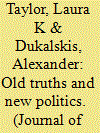

|
|
|
|
|
| Publication |
2012.
|
| Summary/Abstract |
This article analyzes the relationship between truth and politics by asking whether the 'publicness' of a truth commission - defined by whether it has public hearings, releases a public report, and names perpetrators - contributes to democratization. The article reviews scholarship relevant to the potential democratizing effects of truth commissions and derives mechanisms that help explain this relationship. Work from the transitional justice field as well as democratization and political transition more generally is considered. Using a newly-constructed Truth Commission Publicness Dataset (TCPD), the analysis finds that even after statistically controlling for initial levels of democracy, democratic trends in the years prior to a commission, level of wealth, amnesties and/or trials, the influence of the South African Truth and Reconciliation Commission, and different cutoff points for measuring democratization across a number of models, more publicness predicts higher levels of democracy years after the commission has finished its work. The more public a truth commission is, the more it will contribute to democratization. The finding that more public truth commissions are associated with higher levels of democratization indicates particular strategies that policymakers, donors, and civil society activists may take to improve prospects for democracy in a country planning a truth commission in the wake of violence and/or government abuse.
|
|
|
|
|
|
|
|
|
|
|
|
|
|
|
|
| 7 |
ID:
117596
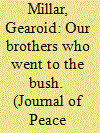

|
|
|
|
|
| Publication |
2012.
|
| Summary/Abstract |
A number of distinct subfields within conflict resolution share foundational theories and emerge from similar understandings of social conflict. One of the most influential of these theories assumes that conflict environments give rise to 'otherizing' dynamics between competing groups. This theory assumes that conflict occurs between and further reifies identity groups. It follows from this theory that conflict resolution practice, and particularly that within the subfield of peacebuilding, must undermine dyadic 'in-group/out-group' conflict through processes of reconciliation and transitional justice. However, the theorized dynamic does not always pertain. In Sierra Leone the truth and reconciliation commission was tasked with fostering reconciliation between the perpetrators and victims of wartime violence. This article describes, however, how former combatants in Sierra Leone are described by many as brothers and friends, as opposed to hated members of a collective 'other'. These findings attest to a distinct lack of 'otherizing' dynamics and demand a reconsideration of peacebuilding practices after what are often considered 'new wars' or 'postmodern conflicts' in sub-Saharan Africa. The article argues that some contemporary conflicts might best be considered post-identity because they are based less on national, racial, religious, or ethnic identity than on circumstance, need, and opportunity. In addition, after post-identity conflicts truth commissions may create new competing identities, such as those between victims and perpetrators. In such cases the applied conflict resolution interventions must emerge from new conflict resolution theory which can adequately understand contemporary conflict dynamics and begin to develop non-identity focused interventions.
|
|
|
|
|
|
|
|
|
|
|
|
|
|
|
|
| 8 |
ID:
117595
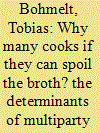

|
|
|
|
|
| Publication |
2012.
|
| Summary/Abstract |
Which factors drive the onset of multiparty mediation? Despite numerous studies explaining the onset of international mediation in conflicts, the literature offers little insight into when we are likely to see 'multiparty mediation', that is, mediation attempts that are conducted by a coalition of interveners. The latter are different from those interventions that only see one mediator, however: mediators forming a coalition are likely to be constrained by different domestic factors and may have different incentives than states pursuing unilateral approaches. Thus, ignoring these patterns can have serious consequences for our theoretical expectations and empirical inferences on mediation onset. In order to address this shortcoming, this article introduces concepts from the coalition-formation literature to the existent research on mediation, and examines the onset of multiparty mediation from a twofold perspective. First, there are supply-side determinants, that is, interveners' incentives for multiparty mediation. Second, the author studies demand-side influences, that is, factors pertaining to the belligerents. By analyzing data for 1950-2000, the following research's main contribution stems from the empirical test of the theoretical framework in a quantitative research design. The results point to a disconnect between the factors that promote single-party mediation onset and those that promote multiparty mediations.
|
|
|
|
|
|
|
|
|
|
|
|
|
|
|
|
|
|
|
|
|